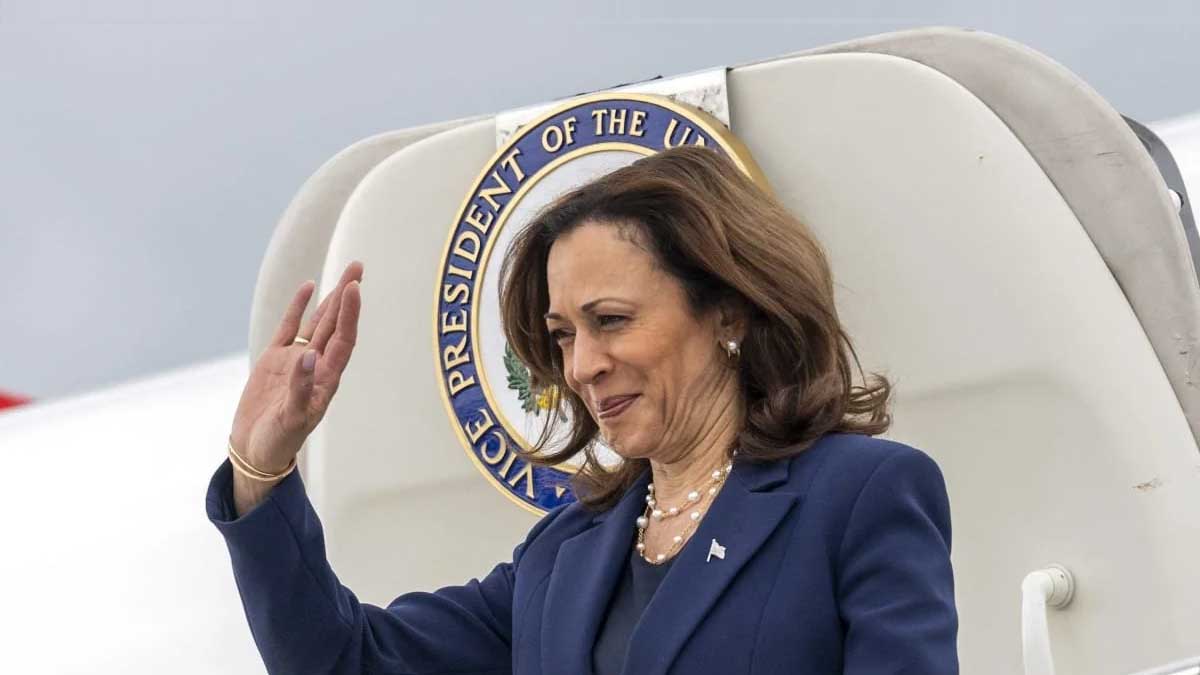- Home
- Billionaires
- Investing Newsletters
- 193CC 1000
- Article Layout 2
- Article Layout 3
- Article Layout 4
- Article Layout 5
- Article Layout 6
- Article Layout 7
- Article Layout 8
- Article Layout 9
- Article Layout 10
- Article Layout 11
- Article Layout 12
- Article Layout 13
- Article Layout 14
- Article Sidebar
- Post Format
- pages
- Archive Layouts
- Post Gallery
- Post Video Background
- Post Review
- Sponsored Post
- Leadership
- Business
- Money
- Small Business
- Innovation
- Shop
Recent Posts
Harris Edges Trump Nationally, Tied in Battlegrounds

According to most polls, Vice President Kamala Harris has made significant gains against former President Donald Trump since taking over the presidential campaign from Joe Biden. The latest survey shows Harris and Trump tied in swing states, with Harris leading Trump by one point nationally. This development marks a notable shift in the political landscape, reflecting Harris’s increasing appeal and Trump’s challenges in maintaining his lead.
In a CBS News poll released Sunday, Harris leads Trump by one point nationally, partly due to increased support from younger and Black voters, as well as women who believe Harris would favor their interests more. The poll, which has a margin of error of 2.1 points, highlights the demographic groups driving Harris’s rise. Younger voters and Black voters, in particular, have expressed a strong preference for Harris, indicating a potential shift in voter turnout and engagement in the upcoming election. Additionally, women have shown a preference for Harris, suggesting that her policies and approach resonate more with female voters compared to Trump.
The CBS News poll, conducted from July 30 through August 2, also found Trump and Harris locked in a tie among voters across seven key battleground states: Michigan, Pennsylvania, Arizona, Wisconsin, Georgia, North Carolina, and Nevada. These states are crucial for both candidates as they hold significant electoral votes and have historically been decisive in presidential elections. The tie in these states underscores the competitive nature of the race and the importance of campaign efforts in these regions.
In a five-way contest with third-party candidates Robert F. Kennedy Jr., Jill Stein, and Cornel West on the ballot, Harris leads Trump by two points, 46% to 44%, according to an Economist/YouGov poll released Wednesday. This poll indicates that Harris maintains her lead even in a more crowded field, demonstrating her ability to attract voters who might otherwise consider third-party candidates. The presence of third-party candidates often complicates the dynamics of the race, but Harris’s lead suggests she is successfully consolidating support among a broad base of voters.
Harris has also led Trump in at least four more polls since Biden dropped out, though Trump leads in at least eight other elections. Most of these polls show her narrowing Trump’s lead over Biden and her approval rating rising since announcing her candidacy. This trend highlights the growing momentum of Harris’s campaign and the shifting public perception in her favor. As Trump continues to lead in several polls, the overall picture remains fluid, with both candidates vying for the upper hand.
Morning Consult’s weekly poll taken July 26-28 shows Harris up by one point, 47% to 46%, with 4% of voters selecting “someone else” and 4% undecided. This is the second week the poll has shown her leading Trump. The consistency of Harris’s lead in consecutive weeks indicates a stable support base and suggests that her campaign strategies are resonating with voters. The presence of undecided voters and those selecting “someone else” also highlights the potential for further shifts in voter preferences as the campaign progresses.
Harris also leads by one point, 43% to 42%, in a Reuters/Ipsos poll released Tuesday, a slight decline from her two-point lead in the group’s previous survey conducted July 22-23. This minor fluctuation illustrates the dynamic nature of the campaign, where small changes in voter sentiment can have significant implications. Despite the slight decline, Harris’s consistent lead in multiple polls underscores her competitive standing.
Meanwhile, Trump led Harris by three points in a July 26-28 Harvard CAPS-Harris poll when voters had the option to choose “don’t know/unsure,” marking a four-point decline from Trump’s seven-point lead over Biden in a June Harvard CAPS-Harris poll. Trump leads Harris by four points in a two-way matchup, consistent with his June polling lead over Biden. The decline in Trump’s lead when voters had more options suggests potential vulnerabilities in his support base, while the consistency in a two-way matchup indicates his core supporters remain committed.
Trump led Harris by one point (48% to 47%) in a New York Times/Siena poll conducted July 22-24, and two points (49% to 47%) in a July 23-25 Wall Street Journal poll. These narrow leads for Trump highlight the tightly contested nature of the race. The small margins suggest that voter sentiment is closely divided, and any shifts in campaign dynamics or major events could swing the advantage in either direction.
Four other polls show Trump leading: He tops Harris by three points (49% to 46%) in an online CNN/SSRS survey taken July 22-23, by two points (47% to 45%) in another Morning Consult poll, by one point (46% to 45%) in an NPR/PBS/Marist poll, and by three points (44% to 41%) in an Economist/YouGov poll conducted July 21-23 that also found Kennedy with 5% support. These results indicate that while Harris is gaining ground, Trump still holds an edge in several surveys, reflecting a competitive and volatile electoral environment.
Polls consistently show Harris outperforms Biden. Before Biden exited the race, he trailed Trump by six points in polls by Morning Consult, CNN/SSRS, The Wall Street Journal, and Times/Siena. Harris’s ability to outperform Biden in head-to-head matchups with Trump suggests that she may have broader appeal or stronger electoral strategies that resonate with voters less supportive of Biden.
The New York Times/Siena poll found voters are more tuned into the race in the aftermath of the June 27 Biden-Trump debate, widely considered disastrous for Biden. About 64% of respondents now say they’re paying a lot of attention to the contest, compared to 48% before the debate. This increased attention indicates that the debate had a significant impact on voter engagement and could influence voter decisions in the months leading up to the election.
Harris leads Trump by one point overall in the seven battleground states likely to decide the election: Michigan, Pennsylvania, Wisconsin, Nevada, Arizona, North Carolina, and Georgia, according to a July 24-28 Bloomberg/Morning Consult poll. Harris is ahead in Michigan, Wisconsin, Arizona, and Nevada; Trump leads in Pennsylvania and North Carolina; and the two are tied in Georgia. The distribution of leads and ties across these states underscores the critical role they will play in determining the election outcome and highlights the importance of targeted campaign efforts in these regions.
Democrats are far more enthusiastic about Harris than they were about Biden, according to the Times/Siena survey. Nearly 80% of voters who lean Democratic want Harris to be the nominee, compared to 48% who said the same about Biden three weeks ago. In stark contrast with sentiment surrounding Biden’s mental fitness, 56% of voters polled by Reuters/Ipsos said Harris was “mentally sharp and able to deal with challenges,” compared to 49% who said the same about Trump and 22% for Biden. A 19th News/SurveyMonkey poll found 87% of Americans agreed with Biden’s decision to end his campaign, and more Americans think the decision will help the Democratic Party (45%) than the Republican Party (29%). The 19th News survey also showed Americans are split on whether Harris’ gender and race will help or hurt her: 31% think being a woman will help her, compared to 33% who think it will hurt her and 34% who see no impact. Respondents were more optimistic that Harris being Black and Indian American will benefit her, with 32% seeing it as helpful compared to 24% seeing it as harmful—though 41% expected it to have no impact.
Trump campaign pollster Tony Fabrizio predicted a “short-term” bump in polls for Harris in the coming weeks as her entrance into the race is expected to reenergize Democrats, referring to the anticipated boost as a “Harris Honeymoon,” in a memo released shortly after the Reuters/Ipsos poll was made public. This prediction suggests that Harris’s initial surge may stabilize as the campaign progresses, and the long-term dynamics will depend on her ability to sustain momentum.
Biden dropped out of the race on July 21 after growing calls from within his party to end his reelection bid following his disastrous performance in the June 27 debate. Biden immediately endorsed Harris, who announced plans to seek the nomination. The party has quickly coalesced around her, with all Democratic governors and most Democrats in Congress backing her. She has effectively clinched the Democratic nomination, as more than half of all delegates have announced plans to formally vote to nominate her—something the party is expected to do in the first week of August. An ABC News/Ipsos poll taken July 26-27 found Harris’ favorability rating has increased to 43%, from 35% in the group’s previous poll taken July 19-20, while Trump’s favorability rating stands at 36% and Biden’s at 37%.
Recent Posts
Categories
- 193 Countries Consortium Partner1
- 193cc Digital Assets2
- 5G1
- Aerospace & Defense48
- AI37
- Arts3
- Banking & Insurance11
- Big Data3
- Billionaires1,276
- Boats & Planes1
- Business332
- Careers13
- Cars & Bikes79
- CEO Network1
- CFO Network17
- CHRO Network1
- CIO Network1
- Cloud10
- CMO Network18
- Commercial Real Estate7
- Consultant1
- Consumer Tech194
- CxO1
- Cybersecurity73
- Dining1
- Diversity, Equity & Inclusion4
- Education7
- Energy8
- Enterprise Tech29
- Events11
- Fintech1
- Food & Drink2
- Franchises1
- Freelance1
- Future Of Work2
- Games149
- GIG1
- Healthcare79
- Hollywood & Entertainment203
- Houses1
- India’s 1000 Richest1
- Innovation46
- Investing2
- Investing Newsletters4
- Leadership65
- Lifestyle11
- Manufacturing1
- Markets20
- Media327
- Mobile phone1
- Money13
- Personal Finance2
- Policy569
- Real Estate1
- Research6
- Retail1
- Retirement1
- Small Business1
- SportsMoney42
- Style & Beauty1
- Success Income1
- Taxes2
- Travel10
- Uncategorized13
- Vices1
- Watches & Jewelry2
- world's billionaires1,245
- Worlds Richest Self-Made Women2
Related Articles
South Korea Plane Crash: A Tragic Loss and Global Mourning
The tragic plane crash at South Korea’s Muan International Airport on Sunday...
By 193cc Agency CouncilDecember 30, 2024H-1B Visa Debate Splits Trump Allies and Silicon Valley
The debate over H-1B visas has once again become a contentious issue,...
By 193cc Agency CouncilDecember 28, 2024Trump Moves $4B Stake in Truth Social Parent, Stock Drops 6%
Donald Trump recently transferred his 57% stake in Trump Media & Technology...
By 193cc Agency CouncilDecember 20, 2024House Rejects Trump-Backed Funding Bill, Shutdown Looms
The U.S. House of Representatives rejected a new government funding bill on...
By 193cc Agency CouncilDecember 20, 2024















Leave a comment